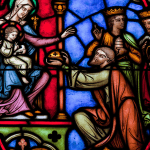
Our reading this week is from the gospel of John, culminating with what we refer to today as Jacob’s ladder:
The next day Jesus decided to leave for Galilee. Finding Philip, he said to him, “Follow me.”
Philip, like Andrew and Peter, was from the town of Bethsaida. Philip found Nathanael and told him, “We have found the one Moses wrote about in the Law, and about whom the prophets also wrote—Jesus of Nazareth, the son of Joseph.”
Welcome Readers! Please subscribe to Social Jesus Here.
“Nazareth! Can anything good come from there?” Nathanael asked.
“Come and see,” said Philip.
When Jesus saw Nathanael approaching, he said of him, “Here truly is an Israelite in whom there is no deceit.”
“How do you know me?” Nathanael asked.
Jesus answered, “I saw you while you were still under the fig tree before Philip called you.”
Then Nathanael declared, “Rabbi, you are the Son of God; you are the king of Israel.”
Jesus said, “You believe because I told you I saw you under the fig tree. You will see greater things than that.” He then added, “Very truly I tell you, you will see heaven open, and the angels of God ascending and descending on the Son of Man.” (John 1:43-50)
The first thing I always chuckle at in this passage is how it characterizes Jesus with a slight case of sarcasm. Philip has found Nathanael and told him about Jesus. Nathaniel’s response is “Can anything good come out of Nazareth?” No sugar coating, no niceties, just says things as he perceives them to be: no pretense. Jesus, meeting Nathaniel, claims Nathaniel doesn’t mince words just to be polite. Nathaniel’s not socially sensitive and doesn’t attempt to hide how he really thinks or feels about something or someone. He has “no deceit.”
Last semester my daughter had the privilege of playing Célimène in her university’s Creative Arts and Theater department production of Molière’s The Misanthrope. The play makes fun of French social hypocrisies like customs of niceness between members of aristocracy with little regard for what is actually true. The show centers around Célimène and Alceste’s relationship and asks whether Alceste is a hero for his uncompromising honestly devoid of all tact or is just a social fool. Alceste and Nathaniel from our reading this week remind me a lot of each other.
Nathaniel doesn’t think deeply about what he’s saying about Nazareth or people who live there. He simply reveals his bigotry toward those people. It’s not honesty or freedom from deceit as Jesus subtly (sarcastically) points out here, but harmful bias.
This passage also reminds me that the early Jesus followers had no decision to “accept” Jesus as their personal, private “Savior.” We’ll unpack this, next.
(Read Part 2)














